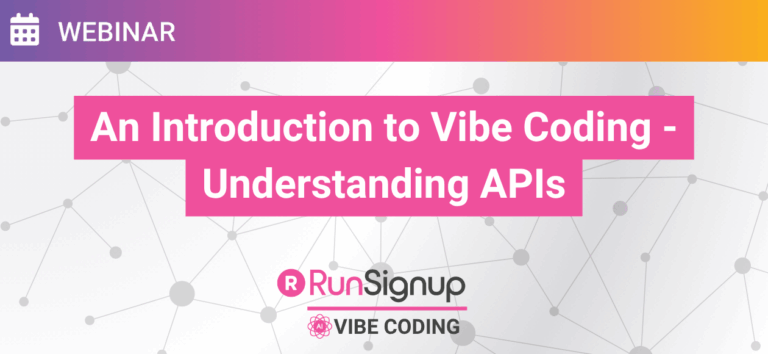Event Information
WHEN
ON DEMAND
If you are interested in vibe coding but do not understand what an API is, start here. We will break down what RunSignup and TicketSignup’s APIs, OAuth2, and MCPs really are in clear, non-technical language. We believe that understanding these core pieces of technology are a necessary foundation for vibe coding practical and applied applications to solve event problems.
Summary of Webinar
Overview
This session explains what APIs are and why they’re the backbone of both RunSignup integrations and modern vibe coding (natural-language app building with AI). You’ll see how the data you already know from dashboard reports maps 1:1 to API methods, how systems pull and push data, the difference between public and private APIs, and how newer concepts like OAuth 2 and Model Context Protocols (MCPs) let AI agents use your data securely and accurately (no hallucinations). The goal: give you the mental model to build small, useful AI-powered tools on your own race data.
What you’ll learn
APIs in plain English
Reports (Participants, Donations, Add-ons, Results, etc.) = the same fields available via API.
APIs let two systems talk: e.g., RunSignup ↔ scoring software or RunSignup ↔ Salesforce.
Pull vs. Push (with real examples)
Pull: Timers pull participants into RaceDay Scoring; CRMs pull donors/fundraisers; Check-In/Ticket apps pull today’s attendees.
Push: RaceDay Scoring pushes results back to your site; Check-In pushes signed waivers and on-site edits.
Public vs. Private APIs
Public (no login): Discovery/marketing data (e.g., Get Races) used by calendar sites like Running in the USA; respects draft/private visibility.
Private (login required): Operational data (participants, donations, transfers). Access controlled by API key/secret today, and increasingly OAuth 2.
Security & access
API Keys/Secrets: Create/manage in Secure Access.
OAuth 2 (modern standard): Sign in, receive short-lived tokens with only your permissions; safer than static keys.
All calls traverse RunSignup’s secure infrastructure; agents only see what you’re authorized to see.
Why APIs matter for AI & vibe coding
APIs are the source of truth that keep AI answers factual (e.g., “How fast was my 8K in 2023 vs 2025?” pulls real Results via API).
MCPs: a translation layer that helps AI agents choose the right API (e.g., “Get Results” vs “Get Fundraisers”) instead of guessing.
Vibe coding tools (e.g., V0, Bolt, Lovable, etc.) can call RunSignup APIs to build mini-apps: custom leaderboards, donor maps, race finders, and more.
Starter patterns you can build
Donor or Fundraiser Leaderboard (Get Fundraisers/Donations).
Donor/Participant Map by ZIP.
Race Finder using Get Races with city/date/distance filters (great first project—public data).
Results Explorer that compares a runner’s performances across years.
Key takeaways
Think of reports = APIs: same data, different delivery.
Pull = read from RunSignup; Push = write back (with permissions).
Use public APIs for open discovery; private APIs for your operations (secured via Keys or OAuth 2).
For AI, APIs prevent hallucinations—they anchor answers to real race data.
MCP + OAuth 2 will let general AI agents securely fetch and act on your data (with your consent)
